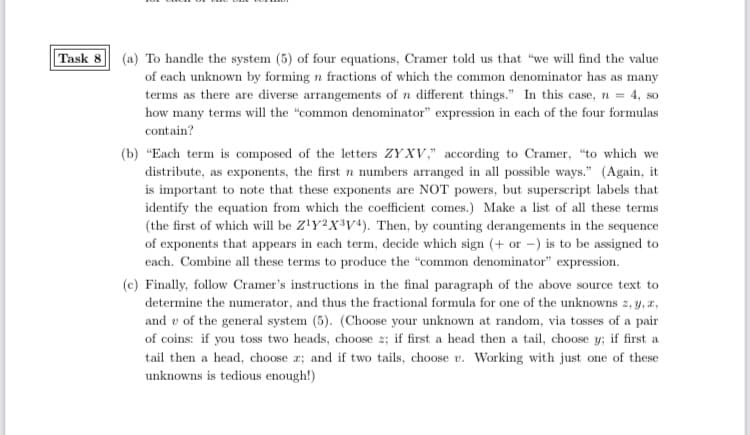(a) To handle the system (5) of four equations, Cramer told us that "we will find the value of each unknown by forming n fractions of which the common denominator has as many terms as there are diverse arrangements of n different things." In this case, n = 4, so how many terms will the "common denominator" expression in each of the four formulas contain?
(a) To handle the system (5) of four equations, Cramer told us that "we will find the value of each unknown by forming n fractions of which the common denominator has as many terms as there are diverse arrangements of n different things." In this case, n = 4, so how many terms will the "common denominator" expression in each of the four formulas contain?
Algebra & Trigonometry with Analytic Geometry
13th Edition
ISBN:9781133382119
Author:Swokowski
Publisher:Swokowski
Chapter9: Systems Of Equations And Inequalities
Section9.1: Systems Of Equations
Problem 13E
Related questions
Question
Task 8

Transcribed Image Text:Task 8 (a) To handle the system (5) of four equations, Cramer told us that "we will find the value
of each unknown by forming n fractions of which the common denominator has as many
terms as there are diverse arrangements of n different things." In this case, n = 4, so
how many terms will the "common denominator" expression in each of the four formulas
contain?
(b) "Each term is composed of the letters ZYXV," according to Cramer, “to which we
distribute, as exponents, the first n numbers arranged in all possible ways." (Again, it
is important to note that these exponents are NOT powers, but superscript labels that
identify the equation from which the coefficient comes.) Make a list of all these terms
(the first of which will be Z'Y²X³V+). Then, by counting derangements in the sequence
of exponents that appears in each term, decide which sign (+ or -) is to be assigned to
each. Combine all these terms to produce the "common denominator" expression.
(c) Finally, follow Cramer's instructions in the final paragraph of the above source text to
determine the numerator, and thus the fractional formula for one of the unknowns 2, y, 2,
and v of the general system (5). (Choose your unknown at random, via tosses of a pair
of coins: if you toss two heads, choose z; if first a head then a tail, choose y; if first a
tail then a head, choose z; and if two tails, choose v. Working with just one of these
unknowns is tedious enough!)
Expert Solution
Step 1
according to bartleby guidelines we can answer only first question and rest can be reposted.
Trending now
This is a popular solution!
Step by step
Solved in 2 steps with 1 images

Recommended textbooks for you

Algebra & Trigonometry with Analytic Geometry
Algebra
ISBN:
9781133382119
Author:
Swokowski
Publisher:
Cengage

Algebra: Structure And Method, Book 1
Algebra
ISBN:
9780395977224
Author:
Richard G. Brown, Mary P. Dolciani, Robert H. Sorgenfrey, William L. Cole
Publisher:
McDougal Littell

Algebra & Trigonometry with Analytic Geometry
Algebra
ISBN:
9781133382119
Author:
Swokowski
Publisher:
Cengage

Algebra: Structure And Method, Book 1
Algebra
ISBN:
9780395977224
Author:
Richard G. Brown, Mary P. Dolciani, Robert H. Sorgenfrey, William L. Cole
Publisher:
McDougal Littell